Why Are My Guppies Dying
5 Reasons Why Your Guppies Are Dying And What You Can Do Right Now To Fix It. TL;DR Friendly.
So instead of relaxing in front of your tank you got yourself questions why are my guppies dying. ou got yourself some guppies. You got them an aquarium, plants, decorations and put a lot of love and care into it.
But for whatever mysterious reason you’re guppies are not responding well to it.
So it got you scratching your head thinking “why are my guppies dying?”
Table of Contents
4 Reasons Why Your Guppies Keep Dying
TL;DR Summary
Why Are My Guppies Dying- Water
Why Are My Guppies Dying- Water
Poor Water Quality
Is this why your guppies dying?
The problem is either with water parameters or water temperature. You may have a problem with your filtration, your tank is overcrowded or you have cycled it properly
Test the water using testing strips. If you find any traces of ammonia or nitrite, perform a water change of 50% or more. Test your filter, water heater ,and ensure the tank isn’t overcrowded.
1) Are pH Levels Killing Your Fish?
High pH (over 8)
Why It Happens
High pH can be caused by:
- Certain substrates (like limestone)
- Adding un-treated water into the tank
- You add too much baking soda to the tank.
- Your tank is overplanted. Plants feed on too much CO2, which causes the pH to rise.
- Your canister filter may be malfunctioning (you’ll know if you have a canister filter. Those are used for larger tanks and typically sit in the tank cabinet)
Troubleshoot It
Use a testing kit to test your current pH level. Anything between 7-8 pH is considered ordinary.
How To Fix It Now
- Perform a 50% water change. Replace “dirty” water with temp-matched, conditioned water. Wait 24, and test again.
- Introduce driftwood, peat moss, or a combination of the 2 into the tank.
- Catappa leaves can be introduced into the tank to help reduce pH.
- Introduce a carbon dioxide reactor to the tank.
- Consider a reverse osmosis system (*those systems only make sense for larger tank setups).
Low pH (Under 7)
Why It Happens
1) Organic waste. Your filter isn’t keeping up with the amount of fish poop and leftover food. This can be because:
- Your filter is malfunctioning.
- Your filter is too small.
- Your tank is overcrowded.
2) You’re experiencing New Tank Syndrome. This happens when you haven’t set up your tank properly by performing a 15-day nitrogen cycle.
Troubleshoot It
You’ll also need to look at your filter and the fish you have in your tank.
- Test your filter to make sure it moves water around the tank properly.
- Check its size- can your filter move the tank’s water at least 6 times per hour? (For example: a 10-gallon would require a 60-gallon per hour filter, minimum)
- Is your tank overcrowded? You should have no more than 1 inch of fish per gallon (for guppies, that’s about 6 guppies per 10 gallons).
How To Fix It Now
- Perform a 50% water change and replace “dirty” water with conditioned, temperature-matched water.
- You may need to clean the tank more often. Just removing the gunk on the bottom with a siphon pump would help.
- You can introduce plants, if none or little are present, to help soak up the carbon dioxide.
- Introduce an air stone or increase the flow of the pump to move more water in the tank.
2) Why Ammonia Is Harmful To Fish
What Causes Ammonia
Ammonia is naturally occurring in fish tanks. It is a byproduct of decomposing fish poop and leftover food.
Yep, there’s no way to stop it from coming in.
How To Troubleshoot It
Test your water using a testing strip to find out your ammonia levels.
While you are looking for 0 ppm (parts per million), your specific testing kit may display this information in a different format.
How To Fix It Now
- Perform a 50% water change and replace “dirty” water with conditioned, temperature-matched water.
- Clean the bottom of the tank/substrate with a siphon pump.
- Check your filter- you need to change the medium in it about once a month. You’ll also need to clean it at the same frequency to make sure it allows enough water to flow.
3) Nitrate & Nitrite- The Toxin Twins
These two are probably some of the more confusing metrics you have to follow if you want your guppies to stop dying.
The reason they are so close together is because they are both compounds of nitrogen.
Since that probably means absolutely nothing to you, I’ll explain-
What Causes it
In one word- ammonia.
Your filter actually takes the ammonia from your tank and converts it to nitrite. Within the same breath, it converts the nitrite into nitrate- to which the fish are a lot less sensitive.
How To Troubleshoot It
Use a testing strip to measure the levels of nitrate and nitrite in your tank.
What's The Max Nitrate For Guppy Tank?
25 ppm. Anything above that and you run the risk of stress and impaired immune function.
What's The Max Nitrite For Guppy Tank?
0. A big fat zero. Even levels as low as .1 ppm can cause serious health problems in guppies because it prevents from their blood carrying oxygen.
How To Fix It Now
How to fix it:
- Test the water using a testing strip. If you find any nitrite- change a minimum of 50% of the water and replace it with conditioned, temperature-matched water.
- Clean the bottom of the tank, either by hand or with a siphon pump.
- Check your filter to make sure it works.
- You may need to replace the filter medium. You should do so monthly, because the available positive bacteria in it dwindles over time.
- If the filter works your tank may be overcrowded. You should have no more than 6-7 guppies for every 10 gallons. If you have other tankmates, you’ll need to count them in when calculating your tank size.
4) Are Water Temps To Blame?
What Causes It
Your thermometer is either malfunctioning, is set to the wrong temperature, is too small/ big for your tank, or your tank is placed in the wrong place.
How To Troubleshoot It
- Is your tank away from windows and other paths of direct sunlight?
- Is it away from AC blow paths, hot pipes, and other sources of cold/hot air?
- Next, you’ll need to take a reading of your water temperature. What does it read?
How To Fix It Now
You want your tank water temperature to be constant. Fluctuation is the worst thing that you can do to your guppies.
- Move your tank away from direct sunlight, AC blow paths, and any other source of temperature-changing environment.
- Ensure your thermometer is appropriately sized for your tank. You can do that by looking up its model online.
- Ensure your thermometer works. Place it in a glass of cold water and check if it heats it up.
- If it doesn’t bring it up to 78-82 degrees, then it might be faulty. On the other hand, it may be overheating it- which is also no good.
Why Are My Guppies Dying- Part 2
Poor Nutrition
Is bad food why your guppies are dying?
TL;DR Version
Poor nutrition opens the door to illness and disease- which eventually lead to death. Guppies need a diet rich in protein, and to be fed about 2-3 times a day. Ensure all guppies are getting fed and no one is being left behind.
Feed your guppies 2-3 times a day with fish food formulated for tropical fish. Compliment their diet with your favorite live food as treat from time to time.
What Causes It
Your guppies may be malnourished and as a result, become vulnerable to disease and illnesses.
Matter of fact, this can be a major reason why your guppies keep dying.
How To Fix It Now
You can tell your guppies are malnourished by looking at them. The biggest tale-tell sign is dull colors. Be aware, dull colors can also be a symptom of sickness and stress, but all are interconnected.
How To Fix It Now
- Feed your guppies a diverse diet, preferably on a set schedule.
- Feed them about 2-3 times per day.
Here’s what you can and can’t feed them:
Do Feed Your Guppies
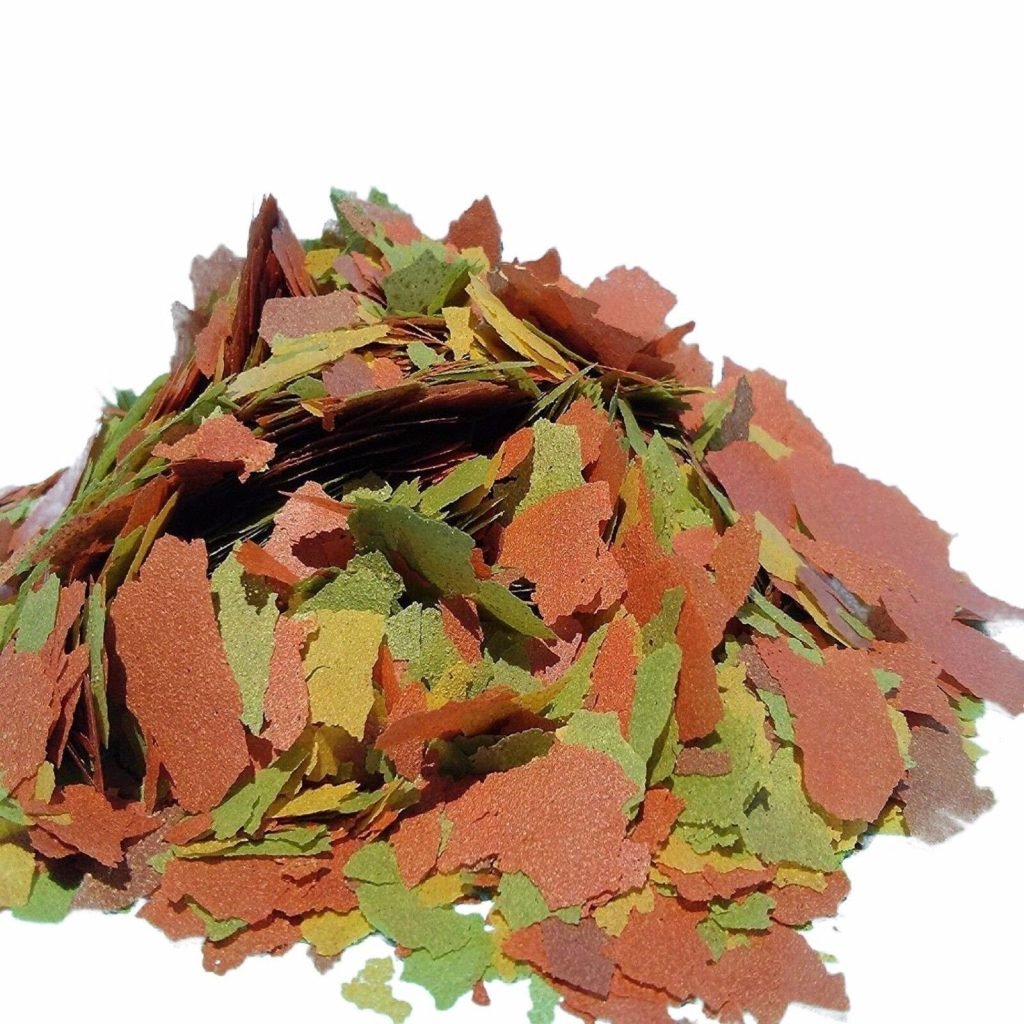
High-Quality Flake Food
Guppies can be fed a staple diet of high-quality flake food specifically formulated for tropical fish.
Look for a brand that contains a balanced mix of proteins, fats, vitamins, and minerals suitable for small tropical fish.
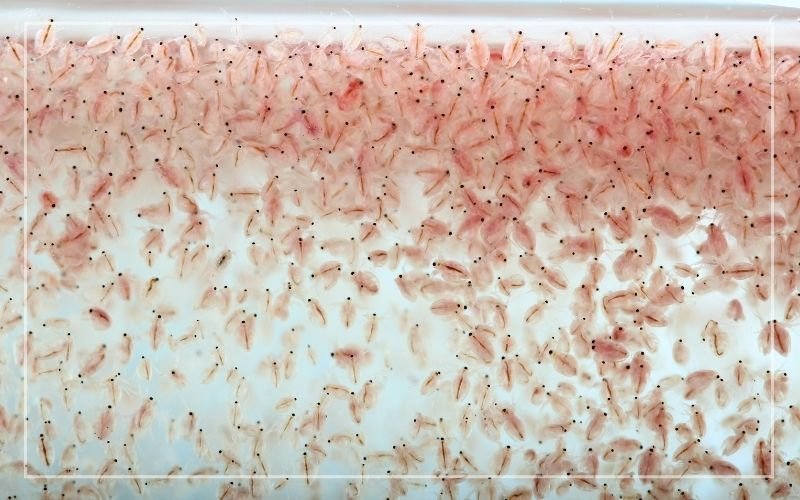
Live and Frozen Foods
Guppies enjoy live or frozen foods such as brine shrimp, daphnia, bloodworms, and mosquito larvae.
These can be provided as occasional treats to supplement their diet.
Frozen foods should be thawed and rinsed before feeding to remove any potential pathogens.
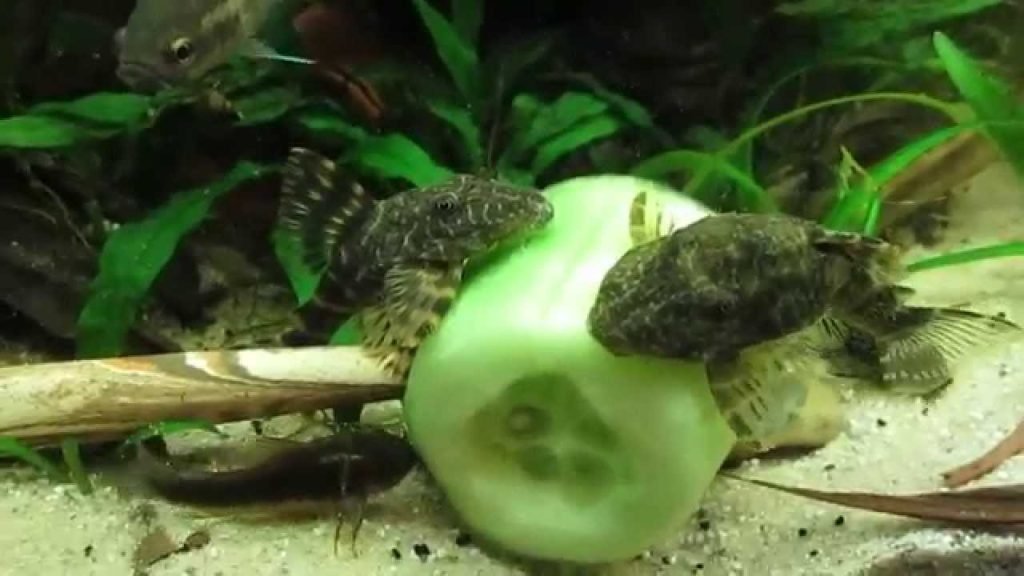
Vegetables
Guppies can also consume blanched vegetables like spinach, peas, and lettuce.
These should be finely chopped or grated to make them easier for the guppies to consume.
Avoid Overfeeding
Overfeeding is a common mistake that can lead to health issues in guppies.
Feed them small amounts of food two to three times a day, and only provide what they can consume within a few minutes.
6 Foods That Can Kill Your Guppies
Chocolate
Chocolate contains theobromine, which is toxic to guppies and can lead to various health issues, including nervous system problems and even death.
Citrus Fruits
Citrus fruits such as oranges, lemons, and grapefruits are acidic and can disrupt the pH balance in the aquarium, potentially harming the guppies.
Onions and Garlic
Onions and garlic contain compounds that can be toxic to guppies.
They can cause damage to the red blood cells and lead to anemia.
Caffeinated Beverages
Drinks like coffee, tea, or any caffeinated beverages are harmful to guppies.
Caffeine affects the central nervous system and can be fatal.
Salty Foods
Guppies are freshwater fish and cannot tolerate high levels of salt.
Feeding them salty foods or snacks like potato chips or pretzels can lead to dehydration and stress.
Processed or Spicy Foods
Processed foods and spicy seasonings often contain additives, preservatives, or spices that can be harmful to guppies.
These can cause digestive issues and even toxicity.
Why Are My Guppies Dying- Part 3
Aggressive Tank Mates
Is an underwater warzone why your guppies are dying?
TL;DR Version
While there are many fishes that are not compatible with guppies, the popular 6 are betta fish, angelfish, African cichlids, red-tailed sharks, tiger bards, and convict cichlids.
Separate the aggressive fish from your guppies by setting up another tank. You’ll need to decide if you want to have 2 tanks, and if not- what to do with the fish.
Betta Fish (Siamese Fighting Fish)
Male bettas are known for their territorial and aggressive behavior, especially towards fish with long, flowing fins like guppies.
Keeping them together can result in fin nipping, stress, and potential harm to the guppies.
Angelfish
Despite their graceful appearance, angelfish can become territorial and may view guppies as food or intruders.
They have long, trailing fins themselves, which can lead to fin damage or aggression towards guppies’ fins.
African Cichlids
African cichlids are vibrant and colorful fish but can be highly aggressive and territorial.
They have a tendency to nip at fins and can cause significant harm to guppies. It is best to avoid keeping them together.
Red-Tailed Shark
Red-tailed sharks are known for their aggressive and territorial behavior, especially towards fish of similar size and shape.
Their active nature can stress out guppies, and their aggressive behavior may result in fin damage or chasing.
Tiger Barb
Tiger barbs are notorious fin nippers and can quickly damage the delicate fins of guppies.
Their active nature and schooling behavior can lead to stress and harassment for the guppies.
Convict Cichlids
Convict cichlids are small but highly aggressive fish. They can become territorial and aggressive towards other tank mates, including guppies.
Their aggressive behavior can lead to injuries and stress in the guppies.
Why Are My Guppies Dying- Part 4
Low Oxygen
Is suffocation why your guppies are dying?
TL;DR Version
Low oxygen is the result of high water temps, overcrowded, lack of surface movement, insufficient light or improper use of chemicals
Each cause will call for its own solution. You can adjust the water temperature, remove some fish/ plants from the tank, install an air stone, or create more surface movement, just to name a few.
Overstocking your aquarium
Remember: every fish you add will need oxygen.
Since oxygen is limited in an aquarium they’re all going to compete for it.
Most beginners forget to account for plants and other tank mates, like shrimp or crabs.
That means that if you go with the 10-gallon tank most beginners go with, then you can have up to 6 guppies.
Also, remember that just because you started with 10 guppies doesn’t mean you still only have 6 guppies.
Each female guppy gives birth every month. While not all will survive- even some surviving can spell trouble- especially in a small tank.
Raised Water Temperatures
We already touched on the topic of water temps earlier,
but just as a reminder- the hotter the water- the less oxygen it has in it.
Some of the most common reasons why the water temperature in your tank rises are evaporation, faulty heaters, and overfeeding.
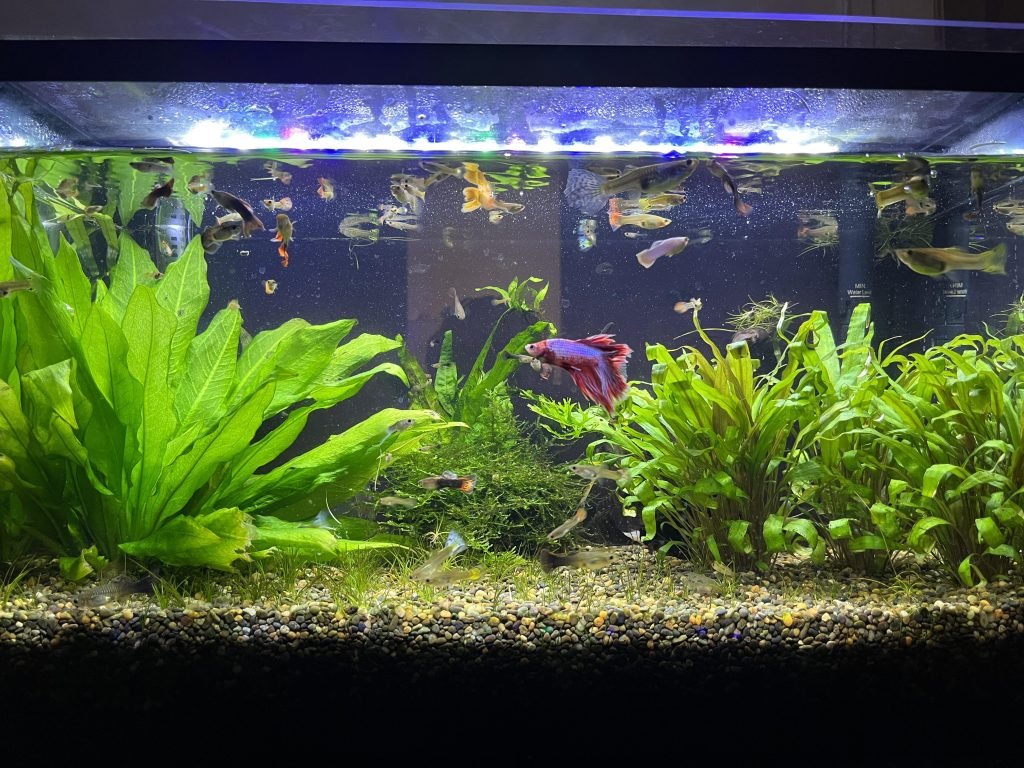
Guppies hanging out on the corner of a tank
- Evaporation- as water escapes the tank due to natural evaporation, the overall water temp may rise as a result.
- Faulty equipment- this one is pretty simple. A faulty water heater may never shut off and continue to work around the clock, even when the desired water temp has been achieved.
- Overfeeding- Bacterial breakdown of organic waste produces gases, which can create bubbles and cause the water level to rise temporarily. Maintaining a proper feeding schedule and regularly cleaning the tank can help prevent this issue.
Lack of surface movement
Surface movement increases the water’s surface area and in turn, allows more oxygen to be available to your guppies.
This is the most important aspect of fish tank oxygenation, and this one usually goes unnoticed.
Here are a few ways to ensure good surface area
- Install and air stone
- Switch to a hang-on-back filter
- Install a Powerhead- submergible motors that can be placed throughout the tank
- Install a wavemaker device that replicates waves
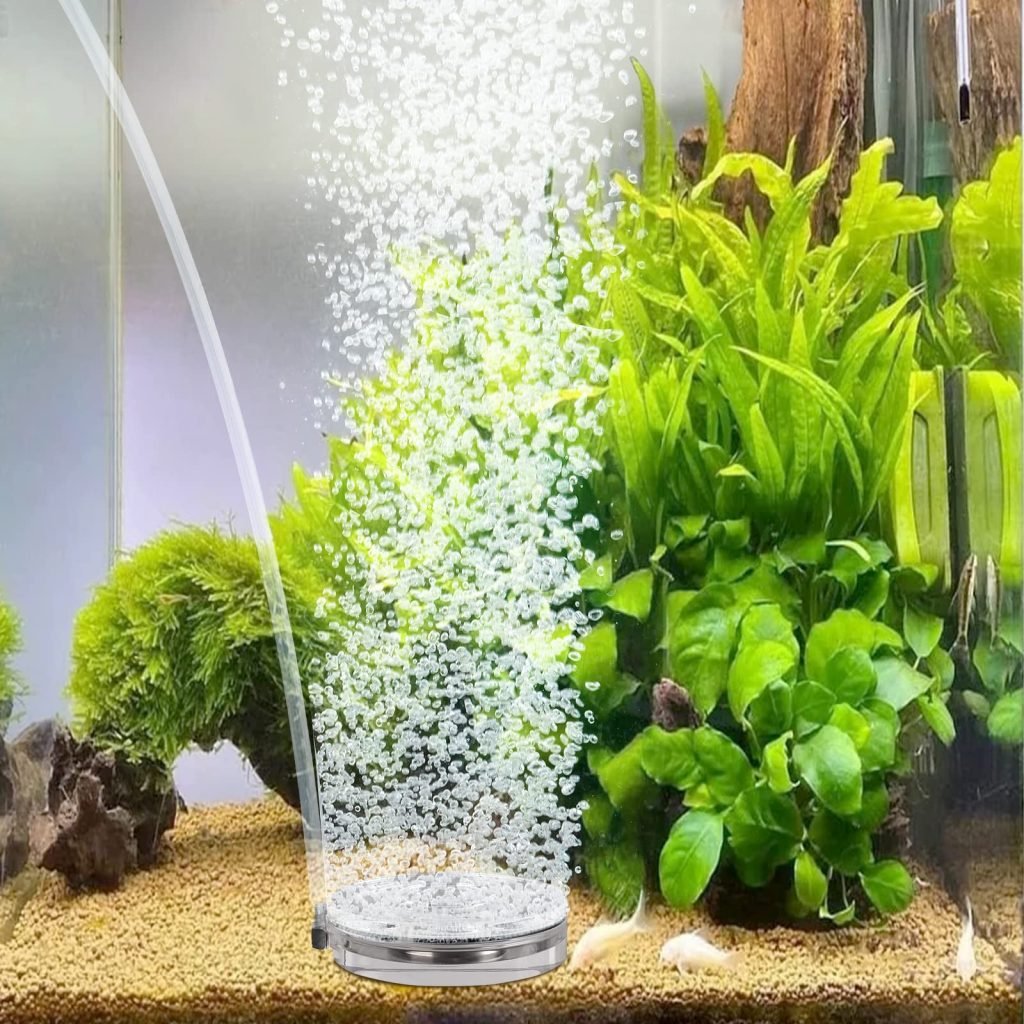
Air stone releasing bubbles in a tank to increase available oxygen
Low Lighting Levels
Plants run on carbon dioxide and in return release oxygen into the water.
But when lighting is scarce this process is reversed and plants end up using oxygen and release carbon dioxide.
Plants run on carbon dioxide and in return release oxygen into the water.
But when lighting is scarce this process is reversed and plants end up using oxygen and release carbon dioxide.
Improper Use Of Chemicals and Medications
Some chemicals, like water conditioners and medications just to name a few, can be the culprit.
When used in incorrect amounts, they may limit the waters ability to harbor oxygen and lead your guppies to die.
The fix is easy: read the label.
3 Signs you have low oxygen in your tank
Guppies will rise to the surface with wide open mouths. They’re gills will be moving rapidly.
If you spot this behavior, you need to act now.
Change 50% of the water in the tank. The new water will have oxygen in it and should give your guppies some well-needed relief.
Inactive Guppies
You’ll see an overall decrease in physical activity, as they’ll swim less, move around less, and eat less.
Surface Congregation
You will find your guppies spending more time at the corner of the tank.
It’s ok if they do so periodically, but if this becomes a habit this may indicate there’s a bigger issue.
Labored breathing
You’ll be able to spot more rapid gill movements as they fight to get more oxygen through their gills.
They will also spend more time at the surface of the tank because of it. swimming to the surface to gasp for air.
Just remember that this behavior is normal when fish are eating.
Conclusion: Why Are My Guppies Dying
There are 4 major reasons why your guppies keep dying:
- Water conditions and temperature
- Nutrition
- Aggressive tankmates
- Low Oxygen
Each of those symptoms will have its own solution. Most are pretty simple solutions that conclude in removing some plants and cleaning the tank.
Note that I didn’t include anything about guppy diseases. Those are usually a byproduct of stress and poor nutrition- which can be addressed by changing the water or making adjustments to the tank.
